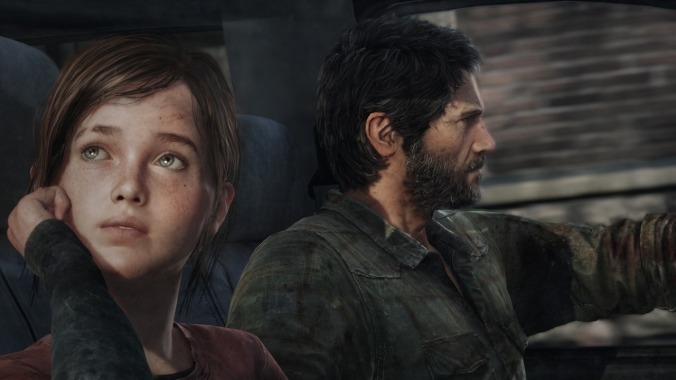A lone survivor recounts what it’s like to be the last person to play The Last Of Us

Every Friday, A.V. Club staffers kick off our weekly open thread for the discussion of gaming plans and recent gaming glories, but of course, the real action is down in the comments, where we invite you to answer our eternal question: What Are You Playing This Weekend?
We are, at the time this column goes to press, one week out from the release of The Last Of Us Part II, the most hotly anticipated big-budget video game since the last one. Review embargoes are lifting, our own A.A. Dowd won’t stop messaging me on Slack about how much he’s enjoying his time with it, and I find myself in a dilemma, a lone survivor stranded in a vast and unkind wilderness. Because it’s increasingly starting to feel like I’m the only person who, uh, never actually played the The Last Of Us…Part I.
“Blasphemy!” I hear you cry from the rafters. “A fool, a pathetic fool!” you scream, baying for my blood. “How could this be?!” someone screeches from atop a high rooftop, before plunging suddenly to their death, unwilling to live in a world with such heresy in it. And yet, it’s true: I didn’t have a PS3 in 2013 when the game out, I was having a tremendously bad 2014 when it got re-released on PS4, and I just never got around to going back to it. Meanwhile, the game filled the consciousness of the last few years of gaming so thoroughly that it felt like I had gotten the gist of everything anyway: Sad man, plucky girl, mushroom zombies aplenty. A quick perusal of the game’s plot on Wikipedia—a bad habit, I know, but so it goes—and I felt like I’d gotten the full The Last Of Us experience.
Still, though, curiosity is a powerful animal. (Also, if I’m going to play The Last Of Us Part II in like six years or whatever, I’ll want to have the background material down.) So I sat down with the game a few nights ago so that I could see what all the fuss was about. (I’ve owned a copy for years, because of course I have.) And you know what? The Last Of Us is a pretty good video game! You should totally play it, I note to the Last Man On Earth-style ball-people I’ve set up around me, a.k.a. the only other “people” to have never played this particular video game.
Admittedly, the baggage I brought to The Last Of Us has impacted my time with it somewhat. It’s a strange thing to know precisely where a story is going the second you sit down to it, whether through memes, thoughtful critical essays, or just cultural osmosis. And yet I’ll confess: The sheer, shocking unsentimentality of the game’s storytelling has frequently caught me off guard despite myself, in an exciting and thrilling way.
For example: I knew, obviously, that grizzled protagonist Joel’s daughter Sarah wouldn’t be making it out of the game’s prologue; I was shocked though, not just by the manner of her death, but by the game’s clever trick of putting me in her shoes for a few minutes in order to force the pain of her dying to land. Ditto the death of his 20-years-later partner Tess. It’s not that I didn’t know she’d die—how else would we get all those iconic moments of Joel and teen charge Ellie alone in the forest?—but that she was killed with such unblinking swiftness. There’s no long, drawn-out goodbye, no exaggerated last stand. Just an unfortunate bite, an offscreen gunfight, and a brief glimpse of her corpse. It’s petty and mean and real in a way I wasn’t necessarily ready for.
At the same time, though, it was easy to see how much of the game’s DNA had leaked into gaming’ general water supply over the last 7 years. None of this stuff—clear delineations between “stealth,” “talking,” and “chase” sequences, the steady drip of character development and dialogue to maintain engagement—was novel when Naughty Dog deployed it way back in 2013. (Large parts of it was lifted liberally from their own Uncharted games.) But the focus on fine-tuning these moments with cinematic precision, of ensuring that every moment of silence was intentionally pointed or deliberate, felt like an important step in the development of a current big-studio gaming model that’s sometimes stifled my enjoyment of late. The Last Of Us makes a big deal out of having expressive play—allowing you to choose whether Joel surmounts threats with stealth, violence, or some hybrid of the two. But it keeps its narrative on lockdown. It has a story it wants to tell, and it’s Joel and Ellie’s, not yours (or mine).
That elimination of choices, in favor of solidified, firmly controlled storytelling, is something I’ve seen crop up a lot lately, in games like God Of War, Red Dead Redemption 2, and other recent entrants into the canon of “masterpiece” big-budget games. The Last Of Us didn’t start the trend—any more than it invoked the “daddening” of games that it’s served as a poster child for in recent years.(And yes, the paternal relationship between Joel and Ellie is undeniably, irresistibly affecting.) But it did give a lot of fuel to the argument that its way was the better way, with “more movie-like” and “more mature” storytelling becoming (falsely, to my mind) synonymous. From what I’ve seen—I just got through the initial raid in Pittsburgh, and am sufficiently hooked that I’ll be taking it through to the end—the story it’s trying to tell is a harsh and heartfelt one, well told and subtly composed. But it still makes me feel just as lonely as when I started this little experiment—just in a different, more informed sort of way.